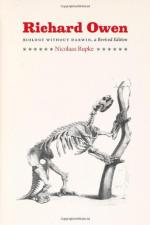|
This section contains 337 words (approx. 2 pages at 300 words per page) |
World of Biology on Richard Owen
Sir Richard Owen was a comparative anatomist, paleontologist, and zoologist. He was the Hunterian Professor of Comparative Anatomy and Physiology at the Royal College of Surgeons, London, from 1836 to 1856. He then became the superintendent of the Natural History Section of the British Museum in London in 1849, and was Superintendent of the entire museum from 1856 to 1883. He is best known as an influential paleontologist during an extremely exciting time in the nineteenth century, when the fossils of extinct dinosaurs were first discovered and their significance in chronicling Earth's biological history started to be understood. In fact, Owen coined the word "dinosaur," and was largely responsible for kindling the dinosaur mania that began in the mid-nineteenth century, and continues today. His first, great popularizing event was the erection of a series of life-sized models of dinosaurs and other extinct creatures at the Crystal Palace in London in 1854, which created an absolute sensation among the Victorian population. Remarkably, a formal dinner partly was held within the body of one of the giant dinosaurs, a model of Iguanodon, as it was nearing completion ( Owen sat at the "head" of the table, and in the head of the dinosaur!
Along with his extensive work on extinct species of vertebrates, Owen also conducted some important studies of living animals. One of his works involved the confirmation of the earlier observations of James Paget, that the deadly parasite Trichina spiralis was the cause of trichinosis in humans, and was transmitted by eating inadequately cooked pork.
Owen was a strong opponent of the theory of Charles Darwin concerning natural selection as a critical force of evolution. To the end of his days Owen refused to accept the theories of evolution, and remained a determined creationist. Owen and other anti-Darwinians have badly lost this scientific and philosophical battle, as the ideas of Darwin and his followers have come to reign virtually supreme among modern biologists. Nevertheless, Richard Owen was perhaps the greatest vertebrate paleontologist of his time,and one of the most influential ever.
|
This section contains 337 words (approx. 2 pages at 300 words per page) |


